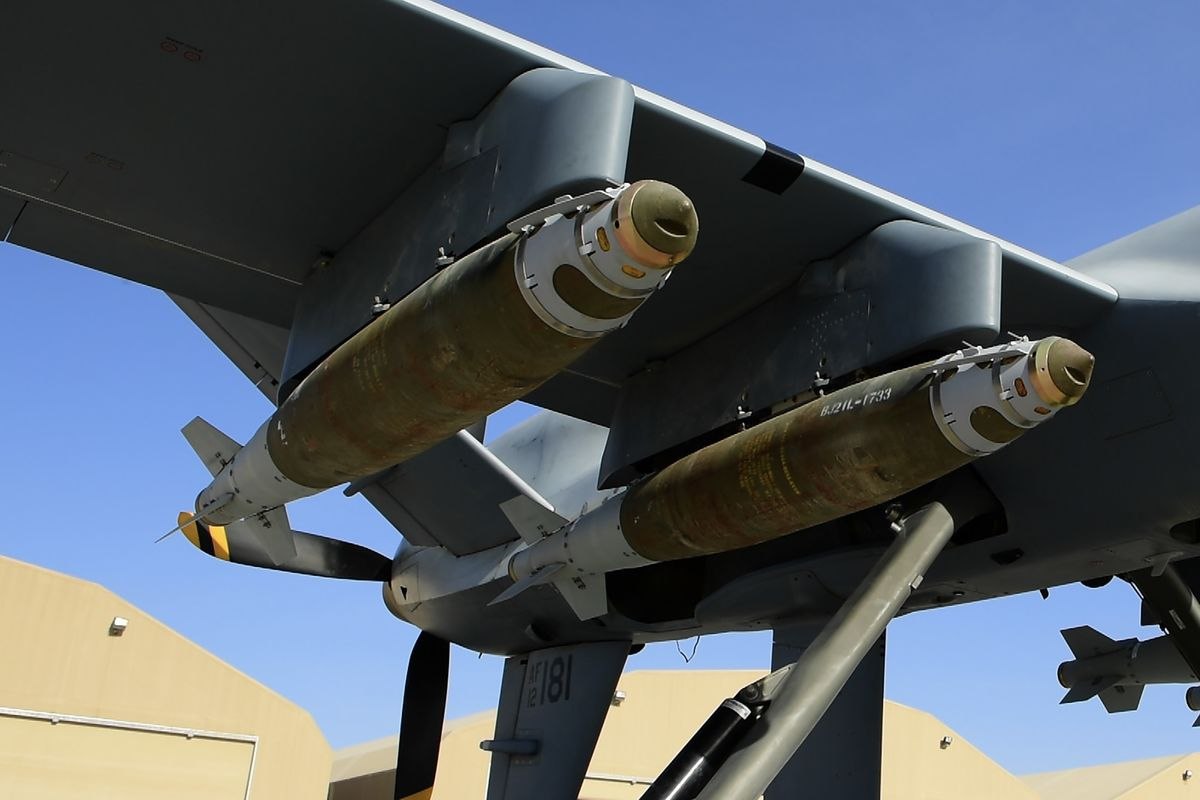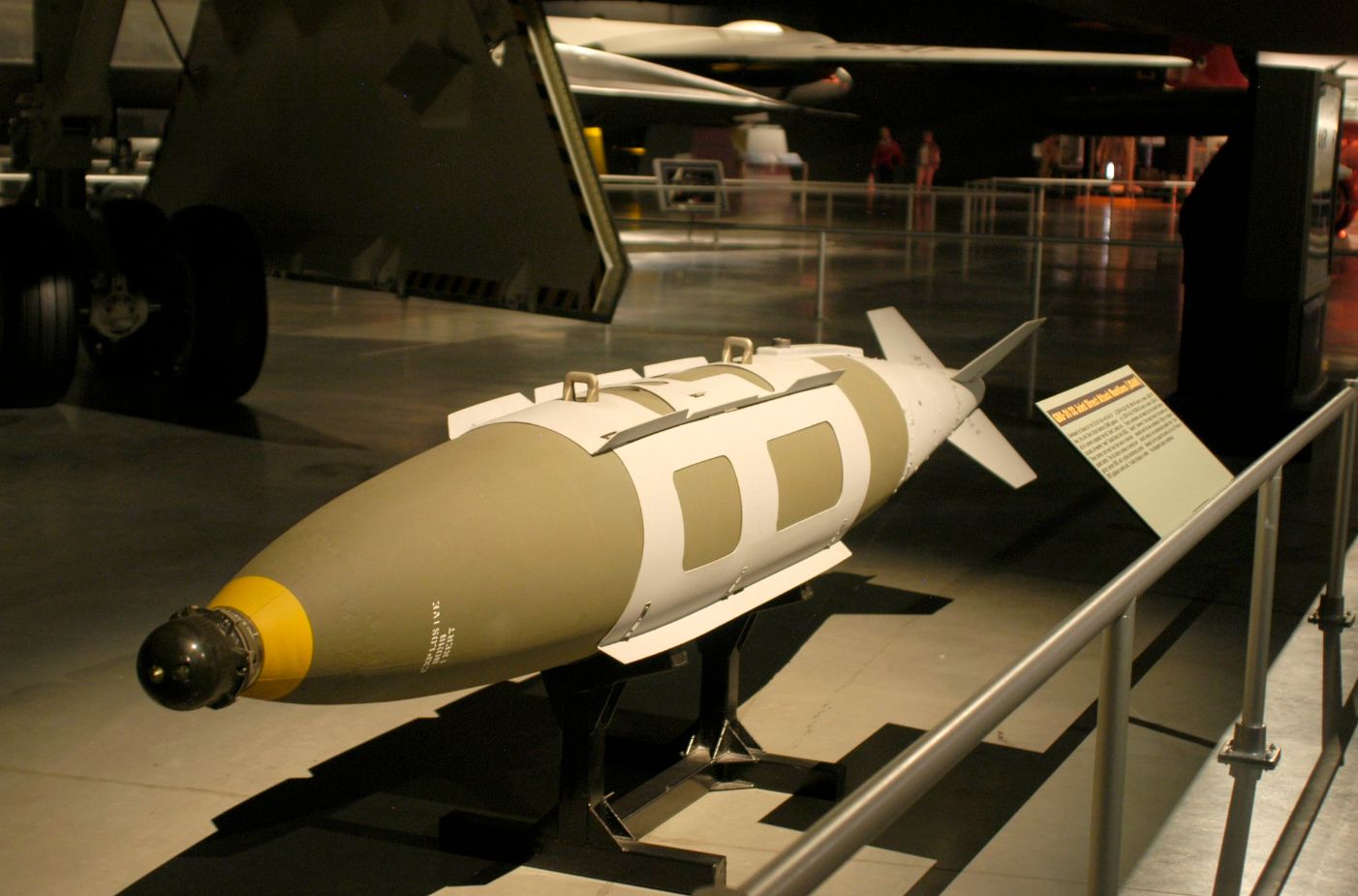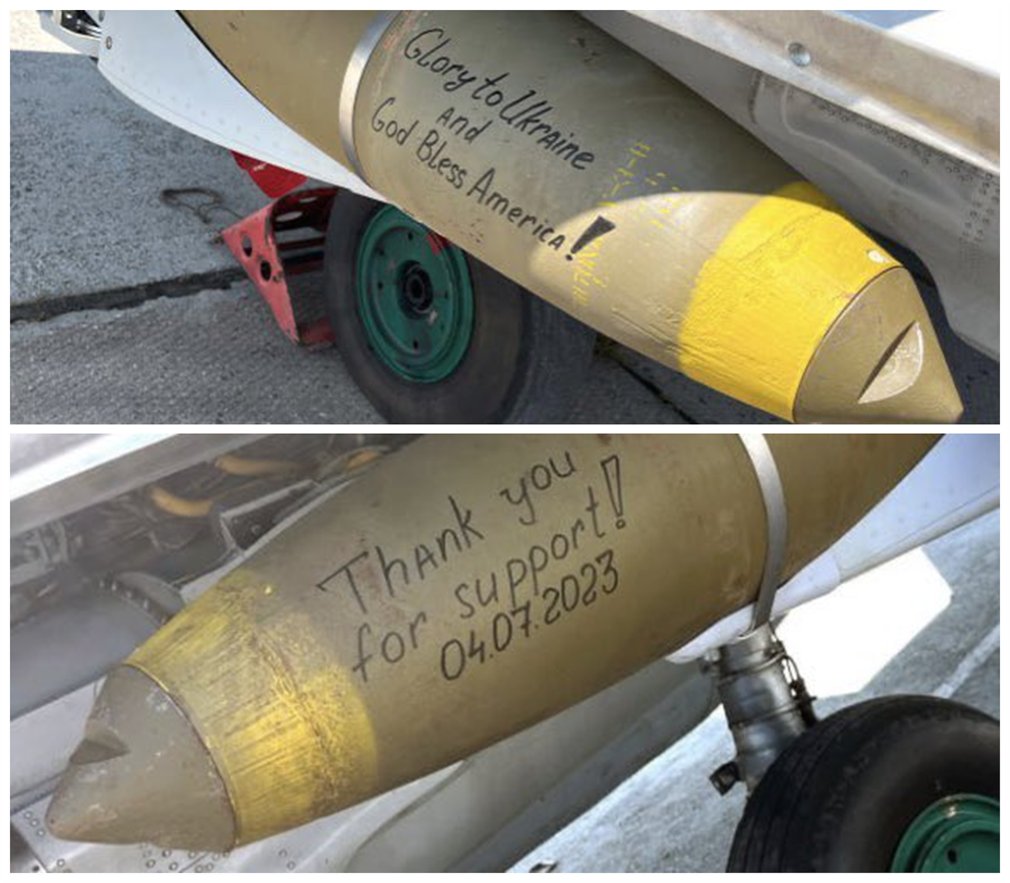The United States is buying add-on seekers that will enable Joint Direct Attack Munition-Extended Range (JDAM-ER) precision-guided bombs provided to Ukraine to target Russian GPS jammers.
In a contracting notice published on May 3, the Pentagon announced that Scientific Applications and Research Associates Inc., based in Cypress, California, had been awarded a $23,554,341 contract by the U.S. Air Force Life Cycle Management Center (AFLCMC) for “the acquisition of Home-on GPS Jam seekers” and “integration of the extended range seekers into existing Joint Direct Attack Munition wing kits.”
The Pentagon’s notice specifically added: “This contract involves Foreign Military Sales to Ukraine.”
The United States has been invested in developing special versions of smart munitions that track and attack sources of electronic jamming, especially in the wake of hostile countries improving their jamming capabilities. The U.S. has been trying to build munitions that would veer the enemy’s jammers off-course.
The details about the seeker system are murky currently but EurAsian Times understands that the Scientific Applications and Research Associates Inc. (SARA) has been working for years to create capabilities similar to this for integration onto several types of precision-guided bombs.
A $9.8 million contract, for example, was reportedly announced in 2014 by officials of the Air Force Research Laboratory at Eglin Air Force Base, Florida, to Scientific Applications & Research Associates Inc. (SARA) in Cypress, California, for a Home-on-Jam demonstration of smart weapons already in the Air Force inventory.
A few years later, in 2020, a test was conducted by integrating these home-on jammers into the USAF’s GBU-39/B Small Diameter Bombs (SDB).
On its part, SARA’s official website says, “SARA Home on Jammer (HOJ) Passive R.F. Seekers have been demonstrated in tactical environments on multiple weapon platforms.” However, EurAsian Times could not derive specific information on these devices developed by SARA.
Last year, the U.S. armed Ukraine with the lethal Joint Direct Attack Munition-Extended Range (JDAM-ER) bombs to bolster Kyiv’s strike capability against Russia. The bombs have been integrated into the Soviet-origin Su-24, Su-27, and MiG-29 Fulcrum fighters by making use of special pylons. The first reports of Ukraine using these smart bombs surfaced in March 2023.

JDAMs are wing kits that transform straightforward free-falling bombs into guided munitions, increasing accuracy by allowing the bomb to change its trajectory as it gets closer to the target with the aid of a GPS. It has pop-out wings that allow it to target objects up to 45 miles away.
When Ukraine first started using these bombs, it was able to strike some crucial Russian targets, as acknowledged by the Ukrainian Air Force spokesperson Yuriy Inhat at the time. However, just a few weeks later, Russian troops deployed jammers to counter them, much like they figured their way around HIMARS after being rattled by them initially.
By April 2023, leaked Pentagon documents indicated that Russian GPS jammers were jamming US-delivered JDAM-ER smart bombs and making them miss their intended targets.

Russia Defeating JDAMs Without Firing A Shot!
At the time, a document marked ‘secret’ and titled “Why are JDAM-ERs Failing? BDA From Recent Strike?” examines why JDAM-ER bombs have failed on the Ukraine battlefield. Two factors potentially explain why there have been “duds and/or misses.”
A factor that contributed to the incident was the incorrect arming of the bomb fuses, which the Ukrainian Air Force was reported to have rectified. Another major factor was the GPS signal problems that resulted in misses due to Russian jamming operations.
“However, the Director of the Joint Navigation Warfare Center (JNWC) stated that based on their analysis, GPS jamming should not have affected the JDAM-ER strikes based on target location compared to active Russian jammers, but other factors may have prevented the JDAM-ER from acquiring GPS signal,” the leaked document reportedly said.
#Ukraine: Presumably one of the first videos showing US-delivered 🇺🇸 guided bombs with JDAM-ER kits in action in Bakhmut, #Donetsk Oblast.
Four GBU-62 were dropped on what is claimed to be an ammo storage point and Russian military staging area. pic.twitter.com/xExafWGAx0
— 🇺🇦 Ukraine Weapons Tracker (@UAWeapons) April 25, 2023
Notably, the document recommended neutralizing the Russian jammers before using the JDAM-ERs to realize the best results in precision strikes. This explains the enthusiasm with which the U.S. has given a contract for the home-on jammer.
Russian land forces have deployed multiple EW systems into the Ukrainian theater of operations. A few of these are specifically designed to jam GPS broadcasts, such as the Russian Army’s tactical R-330Zh Zhitel device. The R-330Zh can detect and attack radio signals in wavebands ranging from 100 MHz to 2 GHz.
According to open sources, the technology can transmit 10 kW of power jamming signals. JDAM kits use signals broadcast on wavebands ranging from 1.164GHz to 1.575GHz, which are the US GPS satellites. These are directly in the catchment area of the R-330Zh. The leaked documents stated that the system can jam up to 30 kilometers (18.6 miles) away.

And this is only one of the many EE.W.jammers that Moscow has deployed along the frontline. So, while the jammers did not make the JADM-ER bombs fail, it did impact the weapon’s accuracy, which is the distinctive feature that makes them useful in combat.
Russia has some of the world’s most advanced electronic warfare equipment and some very experienced personnel to operate such equipment. As per media reports, the Russian forces have been regularly jamming signals from the UU.S.Global Positioning System (GPS) as part of their military campaign in Ukraine.
Against that backdrop, it may be more crucial to provide Ukraine with JDAM-ERs capable of pinpointing Russia’s GPS jammers. Ukraine may be able to target Russian GPS jammers and, consequently, aid in the elimination of the interference they cause, allowing an easy way for Ukrainian munitions aimed at Russian targets behind the front line.
- Contact the author at sakshi.tiwari9555 (at) gmail.com
- Follow EurAsian Times on Google News




